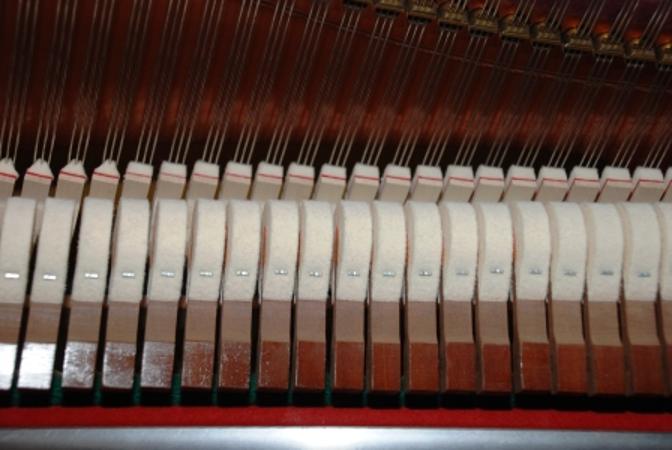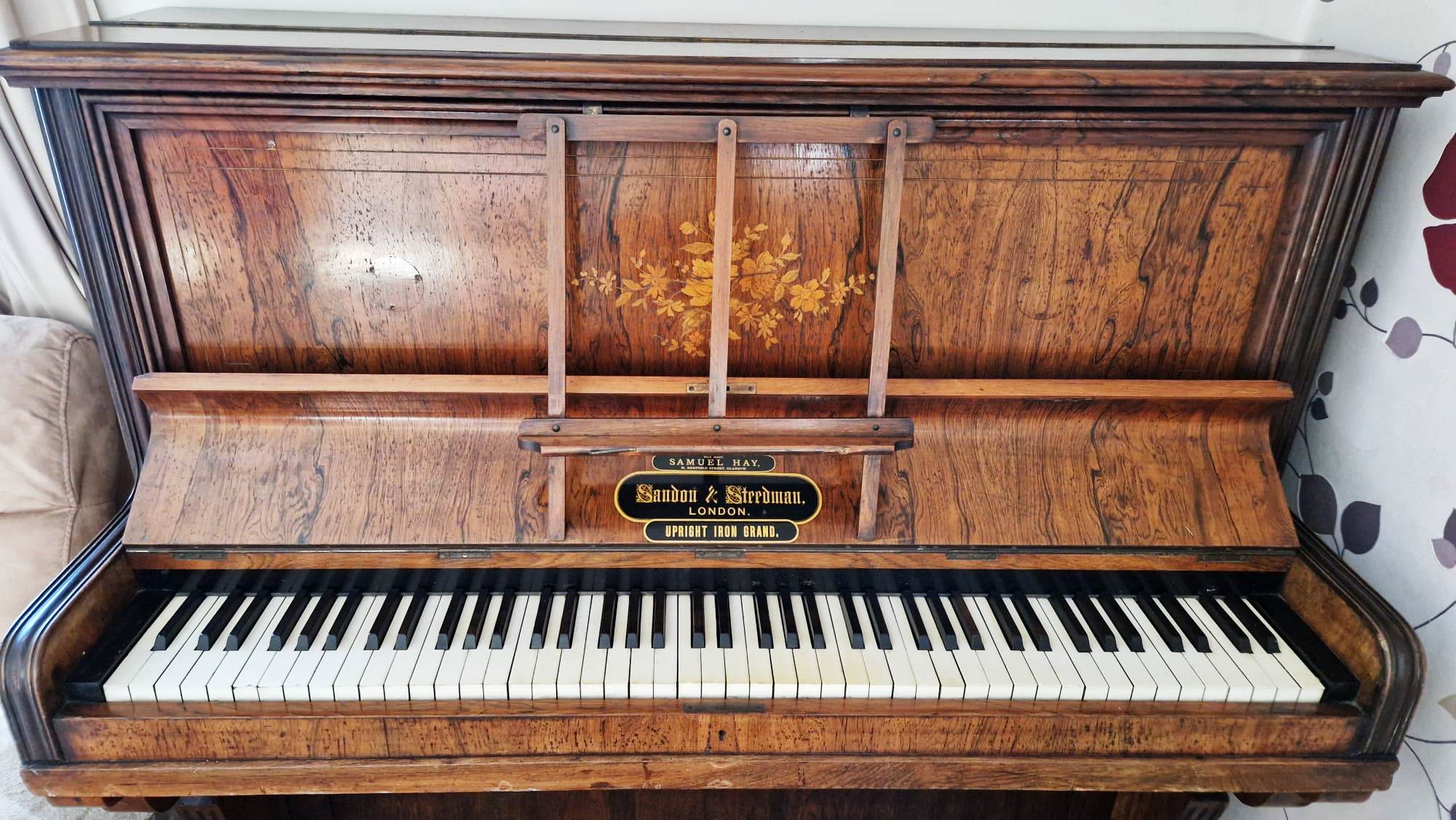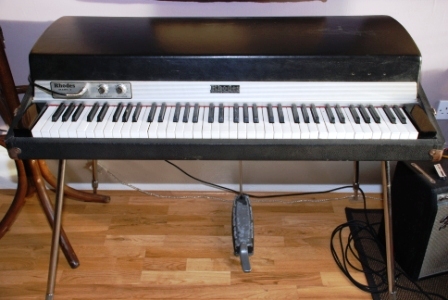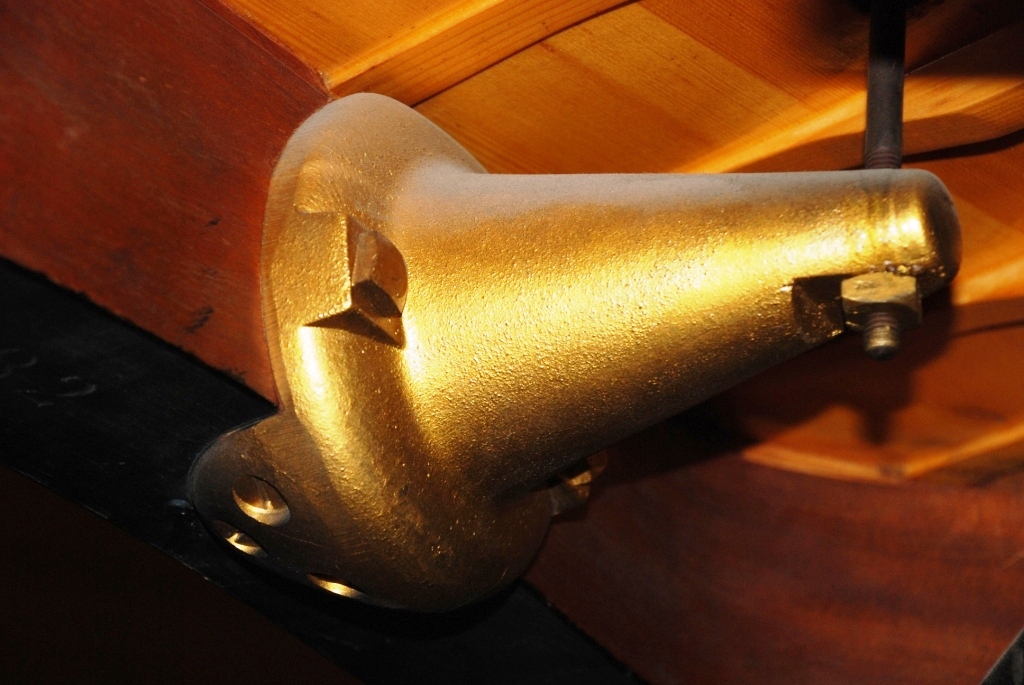Piano Tuner in Inverclyde, Renfrewshire, Glasgow, the west of Scotland and beyond.
Clementi Sonata in Bb 3rd Mvt.mp3

Questions the piano tuner is asked.... and my responses.
Would you like a coffee?
Yes please! Black, with no sugar.
How long will tuning take?
Sixty to ninety minutes is normal, depending on the condition of the piano. For a pitch raise allow at least two hours. Obviously if any repairs are to be carried out, additional time will be needed.
We forgot to book a tuning and there's only a half-hour time window before the band comes to rehearse. Can the piano be tuned in that time?
No.
Do you mind if I/we/the children watch?
I'm a teacher; I like an audience....
Does the room have to be quiet for the piano to be tuned?
Yes.
How often should it be tuned?
We usually say twice a year for a home piano. Annual tuning can be adequate but it often tends to be a “catch-up” and the piano never gets the chance to become as sweet and as stable as it could be. Pianos in daily use by professional musicians and music teachers, and in studio venues, will require more frequent attention. Pianos in concert and recital halls are generally tuned before each use.
Will tuning also include fixing various assorted faults with keys, strings and pedals? Or make the action work better?
No. Tuning is just tuning - adjusting the strings to the correct pitch.
If the piano has several problems, these will need to be assessed and quoted for separately. Many tuners however (including me) will often carry out small repairs or adjustments for regular clients at no extra cost.
I've been given an old piano. It's a bit of a filthy old wreck, horribly out of tune, and the keys don't work properly. Would you like to come and tune it?
No, but thank you for asking
Can you get permanent marker off the keys?
Maybe. It depends on the material the key coverings are made from, and the composition of the marker pen ink. But it’s often possible.
Can you get sticky labels off the keys?
Yes, that’s not too difficult, though tedious.
How should I clean the keys?
The Cory range of piano cleaning and polish products is excellent. Cory Key-Brite is safe on all keys but is relatively expensive in the UK and I can discuss other possible methods with you. For light cleaning, a damp cloth with a little detergent is fine, then polish with a dry cloth. Don't use methylated spirits or other solvents.
The white keys of my old piano are really discoloured - can anything be done to restore them without new key coverings?
Sometimes. It depends on the material the key coverings are made of. See the photo at the bottom of this page for a success story. Yellowed ivory can be whitened by a laborious process, but evenness of results cannot be guaranteed.
What is the white material of the white keys?
The material traditionally used was thin slices of ivory, as it was the most readily available light-coloured rigid material that could be cut into thin wafers. Ivory key coverings are in two parts - heads and tails, for the broad front of the key and the narrow back part respectively. Some very high-grade pianos used single pieces. From the 1880s, plant-derived Celluloid materials started to be used (highly combustible) and various other early plastics, including Galalith, made from milk proteins. Today modern plastic materials are used, and manufacturers have their own propriety formulations which they keep secret. You can find interesting information about piano key coverings on the website of Mr. Mike Morvan pianoandorgankeys.com
Some white keys on my piano are badly chipped or have a piece missing- can this be fixed?
This is much more difficult that you might think. If the white key coverings are ivory, no new ivory coverings are available, and the supply of old ivory key coverings is diminishing. And it is impossible to guarantee an exact colour match. Nor can a simple replacement with plastic be carried out, because 1) the colour probably won't match and 2) plastic key covering materials are much thicker than ivory and the key will then stick up, unless the wood of the key is planed down.
Even replacing a damaged or missing plastic key covering on a more modern piano can be tricky, because the maker may have had their own proprietary key covering material, and the replacements from the trade supply houses may not be an exact match in profile or colour.
Should I keep the keyboard lid closed or open?
For pianos with ivory key coverings, it is thought best keep the lid (the proper name is the Fall) open. The ultraviolet in sunshine is said to prevent the ivory from yellowing (though UV is removed by window glass, so I can't be categorical about this}. For plastic key coverings, the choice of open or closed is a matter of preference. Over time, if a lid is kept open, the front of the piano may fade unevenly.
The finish on my piano has been accidentally scratched or damaged - can you fix this?
Repairing the finish of a piano's casework is expert work, which your tuner/technician can't generally undertake. Such work is done by a few specialist re-finishing workshops. Various types of finish have been applied to pianos over the years; French Polish (shellac), various lacquers, polyurethane and polyester. Working with these requires special facilities and skills. See for example the website of P.T. Piano Polishers
Can you fix my Digital Piano?
No, sorry. Electronic keyboards need an electronic engineer. Bear in mind that the lifespan of electronic keyboards is generally much shorter than that of acoustic pianos. Older models may not be repairable because replacement circuit boards might no longer be made, and few people today repair electronics down to individual component level. In any case, the technology will have moved on.
My old upright piano says "Upright Iron Grand" on it; what does that mean ?
That means it is very old, was a cheap one when brand new, and is probably beyond tuning. You need to replace it.

Can you tune or repair my old Fender Rhodes electro-acoustic piano?

I can tune it, yes. The scope for repairs is limited. These charming instruments are old now, and parts are not generally available. And a fault in the electronics would require other expertise than mine.
Do you work on Pipe Organs?
No, that is a different trade, with its own specialised knowledge and skills.
Should I avoid having the piano against an outside wall?
In most homes today an outside wall is OK. The old idea was that an outside wall could be cooler than the rest of the room, and if the piano was against it, moisture in the room might condense in the piano. Houses today are more insulated.
Does a piano need tuning again if it gets moved within the home?
Generally speaking, no. This notion perhaps arises from Concert pianos which get tuned before each performance. Concert grand pianos are nine feet long and can be tuned to a very fine degree. Often they are moved from a storage area at one temperature and humidity into a performance area at a different temperature and humidity. The piano is then tuned. Perhaps from this arises the idea that a piano will need tuning each time it is moved. At home, that’s probably not the case. Unless you fling it down the stairs.......
I think on this topic it's appropriate to give the last word to Daniel Levitan, from his excellent book The Craft of Piano Tuning:
It seems that nothing will ever shake the conviction of most piano owners and players that the two things that make a piano go out of tune are 1) playing it and 2) moving it. This conviction persists in spite of the fact that most tuners are glad to inform their clients that a piano in reasonably good condition goes out of tune for two entirely different reasons: 1) because it is new, or newly restrung, and 2) because it underwent a change in humidity. (from Supplement H, Why Pianos Go Out Of Tune, p188).
The chapter goes on to discuss lightweight inexpensive uprights that may be slightly de-tuned by a shift in position on an uneven floor).
Could I tune my own piano, if I bought some tools and got an App?
Heh, you could try - there's no law against it. But I guarantee you'd find it a lot more difficult than you imagine....
Is it OK to store my piano in the garage for a while?
No, it really isn't.
Even though your garage may be generally wind and water tight, it just isn't a suitable environment for an acoustic piano. To put one there even for a short while is asking for trouble.
If you cannot store your piano in a room in the house, or have it professionally stored in a proper environment, then it's better to sell it and buy another later.
What is the Steinway "Treble Bell"?
It's this thing:
 The "Treble Bell" is a cone-shaped cast iron bracing attached to the curved rim of the larger Steinway grand pianos (models B,C and D). A bolt goes up from it through the soundboard and is attached to the cast iron plate (frame). This arrangement provides a rigid bracing. Steinway claim that this helps to maintain soundboard curvature ("crown") in the treble, contributing to a clear, penetrating treble sound.
The "Treble Bell" is a cone-shaped cast iron bracing attached to the curved rim of the larger Steinway grand pianos (models B,C and D). A bolt goes up from it through the soundboard and is attached to the cast iron plate (frame). This arrangement provides a rigid bracing. Steinway claim that this helps to maintain soundboard curvature ("crown") in the treble, contributing to a clear, penetrating treble sound.
My piano is an antique. Is it valuable?
Broadly, no. Pianos don't as a rule have antique value.
Exceptions might include: a really unusual instrument of historical interest; a piano with a special "art case" by a famous designer, or one formerly owned by a famous musician.
In the late 19th Century, England had very many small cottage-industry piano assembly workshops churning out cheap instruments made to the lowest standards, for the parlours of lower middle class families who by then had the means to buy them. (See my page on Birdcage pianos ). These entry-level upright pianos were cheap and cheerful and of inferior quality even when brand new, and certainly not envisaged to be in use 130 years later. What confuses the issue is that back then, beautiful hardwood veneers and the skills to work with them were cheap. So these “entry-level” pianos of the late 1800s generally LOOK a lot better than they are.
My piano's really old and there are broken action parts. Can you fix it?
Usually. But in very old pianos, everything will be worn, and action components tend to be fragile. The chances are that if some parts are broken, other parts are going to break. It's a matter of weighing costs against benefits. How much money are you willing to spend, recognising that the value of the piano will still be zero afterwards?
There is a split in my piano's soundboard; what should I do about it?
The consensus with soundboard splits is to leave well alone, provided the piano sounds OK. Very fine hairline cracks can sometimes produce a buzz if changes in ambient humidity cause the edges of the split to rub together. There is no cheap and easy solution to that. But often a piano will continue to perform well for decades with splits in the soundboard. They are usually repaired only as part of a comprehensive rebuild.
Were older pianos better made than modern ones?
There have always been cheap pianos and expensive pianos. Cheap ones have always been poorly made, expensive ones well made. See the question above on antique pianos for comments on 1880s English budget pianos. Some fine older pianos are very interesting to work on and show much evidence of thoughtful design and careful craftsmanship. Certainly too, in some of the older instruments you find big slabs of hardwood the like of which are not seen nowadays. But today's entry-level pianos are generally much better than the low-end pianos of the late 19th century, even if they lack some of the beautiful veneers that were cheap back then. Fine-quality pianos are still fine, and still beautifully made. And priced accordingly. Recent times have brought some interesting new materials into piano manufacturing, and I may add a page about them at some point.
This was my great-granny’s piano. It’s of sentimental value and I could never part with it. Can you make it good?
Not if it wasn't good to begin with. And even if it was good but is now very old, probably not. Don’t be too sentimental about a piano. Your great-granny wouldn’t have wanted you to be. If it’s worn out, it’s worn out. They are, in the end, mechanical devices as well as musical instruments. If great-granny’s piano was one of those low-grade cheap English pianos mentioned above, then it was undistinguished even when brand new, and it owes no-one anything. If you like the look of it, turn it into a drinks cabinet, writing desk or bookcase. If you want a piano to play and enjoy, buy a new one. Your great-granny did. It is in any case noteworthy how firmly the fingers resist the claims of sentiment when it comes to opening the wallet to spend money on the Sentimental Piano.
I have a Lindner piano from the late 1960s and some notes don't play. Can it be repaired?
See the Lindner page of this site for more about Lindner pianos.
Do you cover Ayrshire? Argyll? Glasgow? Renfrewshire? Dunbartonshire? Lanarkshire? Highlands & Islands? Western Isles? The Borders?
Yes, but you will appreciate that a visit to a remote location is not economical for a single piano tuning (unless the owner is willing to factor in the extra travel and time costs).
How can I find out about the age of my piano and the history of the maker?
Serial numbers for major manufacturers have been painstakingly collated and listed in a couple of books. The best for the UK is The Musician's Piano Atlas. I can look up the serial number in this book for you or you may be able to find some information online (online lists are generally cut-down lists taken from The Musician's Piano Atlas).
Some piano websites, and manufacturer websites, also have basic lists of Serial Numbers with dates.
Many piano makers of the past went out of business a long time ago leaving no records. So there are a great many very old pianos whose approximate age can be judged only from the construction and style.
Bill Kibby of pianohistory.info has a lifetime's experience in the UK piano trade and has collected a great deal of information on British pianos and their makers. His website contains a huge wealth of material including many photographs.
Where do new pianos come from?
China, Indonesia and Japan, with a small number still being manufactured in Europe and the USA. And very high-end pianos produced in smaller numbers by Fazioli in Italy and Wayne Stuart & Sons in Australia.
The industry is vastly different today from fifty years ago. Some very fine pianos are being produced in China now, unlike the Chinese pianos of even twenty-five years ago.
The Pearl River factory in Guangzhou - just one of China's eight hundred piano factories, is the world's largest piano maker, producing more than 150,000 pianos a year - 30% of the global market (according to figures on www.worldpianonews.com ). Pearl River pianos appear in the UK under various old European names. They are well made instruments.
I also find pianos made by the Hailun factory to be excellent. Those too appear under various old European brand names.
Here's Page One of a very long list of Chinese makers. Millers Music of Cambridge have a Blog article about the rise of quality Chinese piano making here.
As of 2024 it seems that the vast Chinese piano industry is now facing challenges. Apparently there has been a reduction in demand because a government stipulation that university applicants had to have to arts/music in their background, has changed.
What pianos were made in Scotland?
As far as I can discover, none. Scotland never developed a piano manufacturing industry. Certainly the means existed to provide everything required - foundries, transport links, all kinds of engineering and so on. But I think probably it was a matter of population density. The UK piano trade from the 1880s on was concentrated in Camden, London. You do see pianos "branded" as coming from a supplier in Scotland, but those were bought in from London factories by retailers. Dr Alistair Laurence's excellent book More London Piano Makers on page 47 does however reproduce an archive image from Bonnybridge Foundry in Scotland, showing cast iron plates that they made for Squire pianos of London.
Will you call out and inspect my piano for free?
Not for free, no. And I'm a teacher of English and won't come out and inspect your child's English homework for free either!
What's the normal lifespan of a piano?
About 60 years. After that things are generally pretty worn.
When were grand pianos last made in the UK, and by whom?
It's difficult to find definitive information on this. As far as I can discover, by the late 1970s only two British piano manufacturers were making grand pianos; Welmar, and Danemann.
Danemann made a magnificent 9-foot Concert Grand model (there is one in the Mitchell Library in Glasgow). But according to Dr. Alastair Laurence in Five London Piano Makers, the company were not savvy enough about providing technical support, unlike Steinway who had a sophisticated and responsive after-sales support structure in place for venues and performers. Dr. Laurence notes that some time between 1980 and 1982, the last Danemann Concert grand to be produced was dropped, and destroyed. As late as 1987, Welmar were still producing a 6-foot grand piano, the only grand piano left in a range that had once been extensive. I think that by the end of the 1980s, no grand piano production was taking place in Britain.
Where can people train in the UK to be a piano technician?
In the mid 1980s there were six colleges in the UK offering piano tuning and technology courses. This has dwindled to one remaining college course, at Newark College, part of the Lincoln College Group (for whose Saudi subsidiary company I worked teaching English in Saudi Arabia). You can read about the BA Degree course at Newark here and there are also Foundation courses. This Degree model of training may not suit everyone. As of 2025 the future of the Newark course is in doubt. Shorter courses are available from a private training provider, The Piano Technology School
Concert Pianist Sir Stephen Hough in his memoir Enough: Scenes From Childhood writes of "Mr Jones the elderly piano tuner, with his rusting tools and his worn grey woollen trousers, caked with urine". Are your tools rusty or your trousers caked with urine?
Happily, no to both.
Must piano technicians be able to play the piano?
No. The actions of tuning are quite different from playing the piano. The tuner strikes the keys firmly in what may seem an unmusical manner, as part of achieving stability in the tuning.
But it's fair to say that tuners generally love pianos and the piano repertoire, even if they are not themselves accomplished pianists.
Decades ago when Britain still had a busy piano manufacturing industry, there were many factory and workshop apprenticeships. In that era some young people, generally boys, would find themselves guided towards a training just because it was there, not necessarily because they loved the piano. That's not to say, however, they they didn't become excellent tuners and technicians, or to suggest that there weren't people back then who got into the trade out of love of the piano. Today though, probably all going into this field do so because they really like everything about pianos, piano music and the technical aspects of the instrument.
October 2025 update: I wrote the above three paragraphs in 2011. A new book about the history of the piano tuning trade has just been published (official publication date 6th October 2025). Pages 131-133 have a first-hand account by tuner Nigel King and it very much reflects what I wrote above. See The Vanishing Piano Tuner by Steven Harris, Lewarne Publishing 2025
Although he or she might not be a musician, it's nice for the tuner to be able to play a tune or two to try out the instrument once a tuning is finished.
For a tuner technician who can do much more than play a tune or two, check out the website of Rochdale/Manchester piano technician and concert pianist David Daniels .
Enjoy his fine rendition of Liszt's Liebestraum No 3 here:
The photo below shows old celluloid piano keys that were highly discoloured. Ordinary cleaning methods were ineffective. My secret method was used.....
